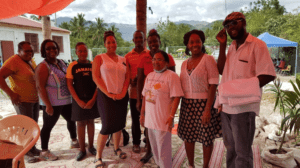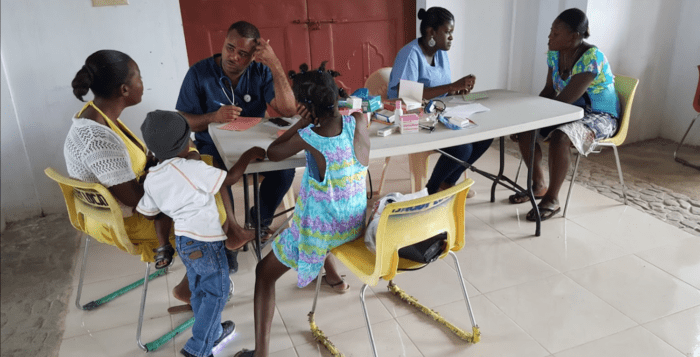It’s easy to be critical of the severe problems Haiti faces, but a group of Huntington residents are taking on the challenge of finding a solution to its health care problems.
Two Huntington residents have organized a group to fly to Haiti Feb. 16 to launch their second free mobile medical clinic to provide basic medical services to those in desperate need.
“Last year was the first time we did a clinic,” Pastor Georges Franck said. “It was so successful that we decided to do it again last year.”
Franck, leader of Huntington Station’s Church of God, is working in partnership with Yam Community Resource Inc., a Huntington Station-based nonprofit that offers quality-of-life services for the Haitian community, to assemble a team of medical professionals to run a three-day medical clinic in Aquin, a city on the southern coast of Haiti.
“We expected we will have maybe 100 people a day, and we ended up at least 300 a day,” said Ginette Rows, president of Yam Community Resource. “By the time we finished, we saw 1,079 people. This year, I expect more.”

Since Hurricane Matthew devastated the island in October 2016, Rows said it has been a struggle to rebuild as the hurricane was the first of a chain of natural disasters that has led to high unemployment rates. Word of the medical clinic is spread primarily via word of mouth, according to Rows. Locals from the surrounding villages will travel long distances — often walking for hours — in hopes of being seen by a physician.
“The people we are seeing do not have the financial means to pay for medical care,” she said. “If you have money, the priority is feeding the family, shelter and paying for school.”
Donations are collected from the approximately 120 members of the Huntington parish to purchase basic medical supplies, such as scales, and over-the-counter medication, according to its pastor. Franck said medications like Advil, which may cost $6 or $8 in the U.S., may wind up costing $12 to $13 in Haiti due to increased costs of shipping and accessibility. Each volunteer pays his or her own travel costs and expenses.
The hundreds who line up to visit the clinic each day are screened by a team of nurses, Rows said, who is a nurse herself. The nurses take their blood pressure, pulse, medical history and check blood sugar to screen for diabetes. Among the most common issues are malnutrition, maternal care, dental issues and high blood pressure.
“There are 2-, 3-, 4- and 5-year-olds that are severely underweight,” Rows said. “Last year we weren’t prepared to weigh them, so we’ve shipped down our own scales, so we can see how big of an issue it is.”
Her goal, as a Haitian immigrant whose father was among the first to come to Huntington in the 1960s, is to collect organized data on the specific medical issues treated to recruit specialists to join the team at future clinics to improve Haitians’ quality of life. She hopes to eventually build a permanent partnership with local hospitals and medical organizations to improve the standards of preventative health care for residents.
“I consider myself a member of the Haitian family,” Rows said. “Regardless of religion, I am there to assist them in some way.”
To learn more about Yam Community Resource, visit its website at www.yamcommunity.com.





